宾语从句和表语从句的用法
宾语从句和表语从句
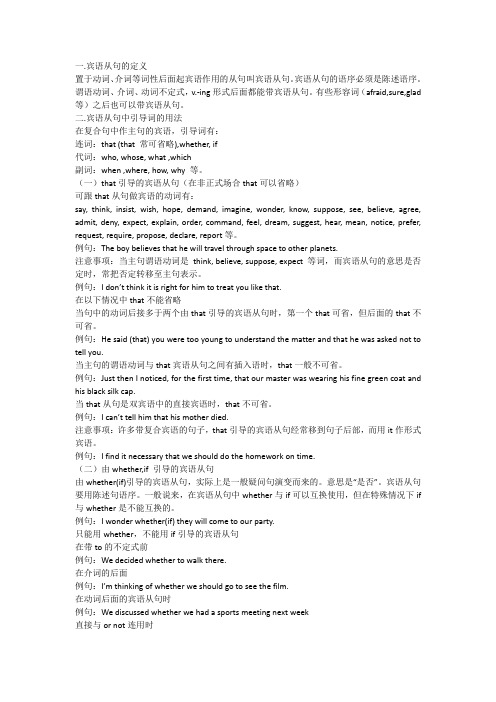
一.宾语从句的定义置于动词、介词等词性后面起宾语作用的从句叫宾语从句。
宾语从句的语序必须是陈述语序。
谓语动词、介词、动词不定式,v.-ing形式后面都能带宾语从句。
有些形容词(afraid,sure,glad 等)之后也可以带宾语从句。
二.宾语从句中引导词的用法在复合句中作主句的宾语,引导词有:连词:that (that 常可省略),whether, if代词:who, whose, what ,which副词:when ,where, how, why 等。
(一)that引导的宾语从句(在非正式场合that可以省略)可跟that从句做宾语的动词有:say, think, insist, wish, hope, demand, imagine, wonder, know, suppose, see, believe, agree, admit, deny, expect, explain, order, command, feel, dream, suggest, hear, mean, notice, prefer, request, require, propose, declare, report等。
例句:The boy believes that he will travel through space to other planets.注意事项:当主句谓语动词是think, believe, suppose, expect 等词,而宾语从句的意思是否定时,常把否定转移至主句表示。
例句:I don’t think it is right for him to treat you like that.在以下情况中that不能省略当句中的动词后接多于两个由that引导的宾语从句时,第一个that可省,但后面的that不可省。
例句:He said (that) you were too young to understand the matter and that he was asked not to tell you.当主句的谓语动词与that宾语从句之间有插入语时,that一般不可省。
高三英语必修三知识讲解 宾语从句和表语从句

宾语从句和表语从句概念引入She doesn’t know (that) her father is seriously ill. 她不知道她父亲病得很严重。
Can you tell me how I can get to the railway station?你可以告诉我怎么去火车站吗?The problem is when they can get there. 问题是他们什么时候能到那儿。
The problem is whether we can replace her. 问题是我们能否替换她。
看到宾语从句四个字,你一定想“我学过了”,那么从上面4个句子中,你能够很容易地判断出前两个句子含有宾语从句,而后两个句子的黑体词部分就是表语从句了吧?本单元我们就从复习宾语从句开始,开始对名词性从句中的位置很相似的这两个从句进行一下小结吧。
语法讲解认识名词性从句1. 名词能作什么成分研究下面这个简单的句子:Lily, my sister, is a good girl, and she likes music.主语同位语系动词表语主语谓语宾语分析:此句是and连接的一个并列句,含有两个小句子,and前的句子的结构是“主系表”结构,and后是“主谓宾”结构。
其中主语、表语、宾语和同位语都是名词或名词词组(如a good girl)充当的,当然主语she是代词,而代词是用来代替名词,从而避免重复的词。
换句话说,名词在句子中可以作主语、宾语、表语和同位语。
2. 名词性从句的定义:在句子中起名词作用的句子叫名词从句(Noun Clauses)。
名词从句的功能相当于名词词组,它在复合句中能担任主语、宾语、表语、同位语、介词宾语等,因此根据它在句中不同的语法功能,名词从句又可分别称为主语从句、宾语从句、表语从句和同位语从句。
现在,再次研究“概念引入”中的句子,你对名词性从句有了很清晰的认识了吧?3. 判断下面的名词性从句(划线部分)是什么从句。
高中英语知识点归纳宾语从句与表语从句的区别
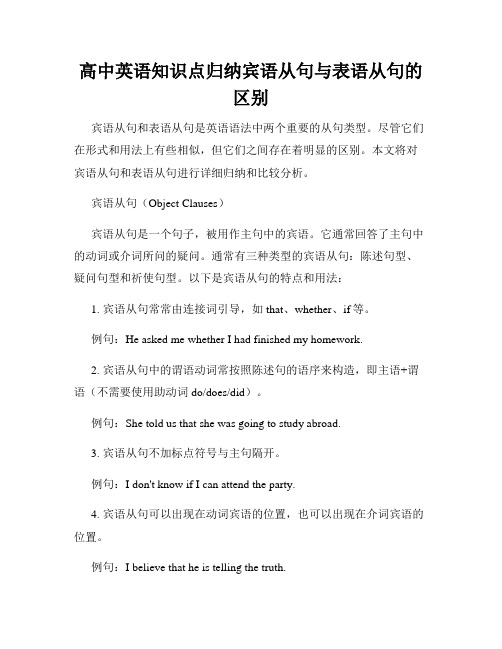
高中英语知识点归纳宾语从句与表语从句的区别宾语从句和表语从句是英语语法中两个重要的从句类型。
尽管它们在形式和用法上有些相似,但它们之间存在着明显的区别。
本文将对宾语从句和表语从句进行详细归纳和比较分析。
宾语从句(Object Clauses)宾语从句是一个句子,被用作主句中的宾语。
它通常回答了主句中的动词或介词所问的疑问。
通常有三种类型的宾语从句:陈述句型、疑问句型和祈使句型。
以下是宾语从句的特点和用法:1. 宾语从句常常由连接词引导,如that、whether、if等。
例句:He asked me whether I had finished my homework.2. 宾语从句中的谓语动词常按照陈述句的语序来构造,即主语+谓语(不需要使用助动词do/does/did)。
例句:She told us that she was going to study abroad.3. 宾语从句不加标点符号与主句隔开。
例句:I don't know if I can attend the party.4. 宾语从句可以出现在动词宾语的位置,也可以出现在介词宾语的位置。
例句:I believe that he is telling the truth.They are discussing whether to go on a trip.表语从句(Predicate Nomination Clauses)表语从句用来说明主语的身份、状态、特点等,并与系动词(如be、seem、appear等)连用,充当系动词的宾语。
以下是表语从句的特点和用法:1. 表语从句通常由连接词引导,如that、whether等。
例句:His dream is that he becomes a successful businessman.2. 表语从句中的谓语动词与主从句的主语保持一致。
例句:The problem is that we have run out of time.3. 表语从句不加标点符号与主句隔开。
what宾语从句和主语从句 表语从句
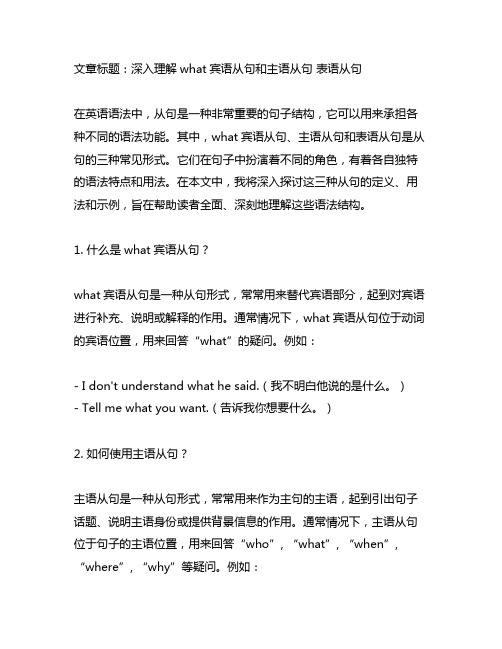
文章标题:深入理解what宾语从句和主语从句表语从句在英语语法中,从句是一种非常重要的句子结构,它可以用来承担各种不同的语法功能。
其中,what宾语从句、主语从句和表语从句是从句的三种常见形式。
它们在句子中扮演着不同的角色,有着各自独特的语法特点和用法。
在本文中,我将深入探讨这三种从句的定义、用法和示例,旨在帮助读者全面、深刻地理解这些语法结构。
1. 什么是what宾语从句?what宾语从句是一种从句形式,常常用来替代宾语部分,起到对宾语进行补充、说明或解释的作用。
通常情况下,what宾语从句位于动词的宾语位置,用来回答“what”的疑问。
例如:- I don't understand what he said.(我不明白他说的是什么。
)- Tell me what you want.(告诉我你想要什么。
)2. 如何使用主语从句?主语从句是一种从句形式,常常用来作为主句的主语,起到引出句子话题、说明主语身份或提供背景信息的作用。
通常情况下,主语从句位于句子的主语位置,用来回答“who”, “what”, “when”, “where”, “why”等疑问。
例如:- What he said is true.(他说的是真的。
)- It is important that we arrive on time.(我们准时到达是很重要的。
)3. 表语从句的定义和用法表语从句是一种从句形式,常常用来说明主语、宾语或其他成分的身份、状态或性质。
通常情况下,表语从句位于动词“be”后面,用来回答“what”, “who”, “where”等疑问。
例如:- The problem is that we don't have enough time.(问题是我们没有足够的时间。
)- His wish is that you can attend the party.(他的愿望是你能参加聚会。
)结语:通过深入了解what宾语从句、主语从句和表语从句的定义、用法和示例,我们可以更好地掌握这三种从句的语法特点和作用。
宾语从句和表语从句详解
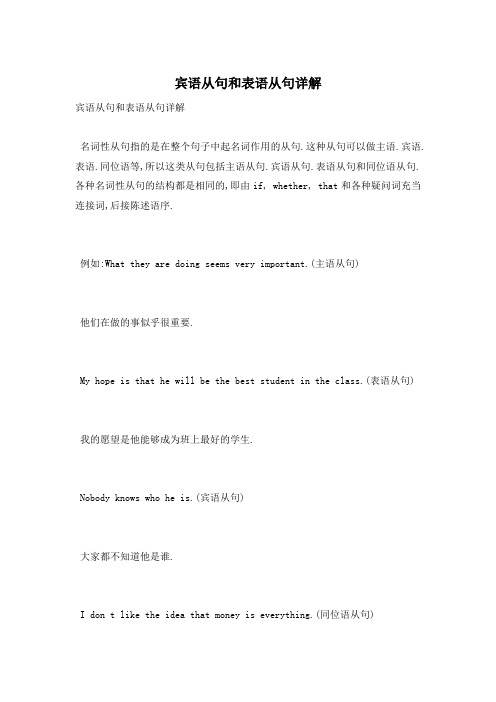
宾语从句和表语从句详解宾语从句和表语从句详解名词性从句指的是在整个句子中起名词作用的从句.这种从句可以做主语.宾语.表语.同位语等,所以这类从句包括主语从句.宾语从句.表语从句和同位语从句.各种名词性从句的结构都是相同的,即由if, whether, that和各种疑问词充当连接词,后接陈述语序.例如:What they are doing seems very important.(主语从句)他们在做的事似乎很重要.My hope is that he will be the best student in the class.(表语从句)我的愿望是他能够成为班上最好的学生.Nobody knows who he is.(宾语从句)大家都不知道他是谁.I don t like the idea that money is everything.(同位语从句)我不喜欢金钱就是一切这一观点.引导名词性从句的连接词中,除了that,if和whether之外其它的都作从句中的一个成分.【宾语从句】在句子中作动词或介词宾语的从句叫做宾语从句.引导宾语从句的词有连词that, whether, if;连接代词who, which, what以及其强调形式 whoever, whichever, whatever; 连接副词 when, where, why, how等.例如:Do you know where the Greens live?I have no interest in how rich he is.宾语从句主要用于下面五种结构:1.由that引导的宾语从句(that 引导宾语从句时,特别是在口语中可省略)The boy believes that he will travel through space to other planets.that引导的宾语从句多用于say, think, insist, wish, hope, demand, imagine, wonder, know, suppose, see, believe, agree, admit, deny, e_pect, e_plain, order, command, feel, dream, suggest, hear, mean, notice, prefer, request, require, propose, declare, report等后.当主句谓语动词是 think, believe, suppose, e_pect 等词,而宾语从句的意思是否定时,常把否定转移至主句表示.例如:I don t think it is right for him to treat you like that.(= I think it is not right for him .)that不能省略的情况:(1)当句中的动词后接多于两个由that引导的宾语从句时,第一个that可省,但后面的that不可省.如:He said (that) you were too young to understand the matter and that he was asked notto tell you.(2)当主句的谓语动词与that宾语从句之间有插入语时,that一般不可省.如:Just then I noticed, for the first time, that our master was wearing his fine greencoat and his black silk cap.(3)当that从句是双宾语中的直接宾语时,that不可省.如:I can t tell him that his mother died.2.由特殊疑问词引导的宾语从句这样的宾语从句实际上是由特殊疑问句变化而来的,宾语从句要用陈述句语序.用于这种结构的动词常常是:see, say, tell, ask, answer, know, decide, show, find out, imagine, suggest, doubt, wonder, discover, understand, inform, advise等.I can t decide which book I should buy.3.由whether(if)引导的宾语从句I wonder whether(if) they will come to our party.由whether(if)引导的宾语从句,实际上是一般疑问句演变而来的.意思是是否 .宾语从句要用陈述句语序.一般说来,在宾语从句中whether与if可以互换使用.4.宾语从句后带有宾补时,需用it作形式宾语,而把宾语从句放在句后,这时that不省略.例如:He thought it wrong that they left the child alone at home.【表语从句】在句子中作表语的从句叫做表语从句.引导表语从句的词有连词that,whether;连接代词who,what,which;连接副词when,where,how,why以及其它连词as if,as though,because等.例如:The question is whether it is worth reading.They are just what I want.That s why they were late.1.含有表语从句的复合句中的主语通常是fact,truth,e_planation,problem,opinion,view等.如:The fact is that fish can t go without water.事实是鱼离开水不能存活.2. as if (as though)也可以用于表语从句.但多是以下面形式出现.主语+look(seem)as if+从句如:It looked as if it was going to snow.It seems as if there will be a quarrel soon.注意:不用 if 引导表语从句.reason做主语时,表语从句应由that引导,不用because. that 引导表语从句时,通常不能省略.专项练习(附答案)1. I flew to New York for the talk show on TV last week. Is that ______you had a few days off?A. whyB. whenC. whatD. where2. I ask her _____ come with me.A. if she willB. if will sheC. whether will sheD. will she3. It was a matter of _______ would take the position.A. whoB. whoeverC. whomD. whomever4. Can you tell me ________?A. who is that gentleman isB. that gentleman is whoC. who that gentleman isD. whom is that gentleman5. Can you tell me ________ the railway station?A. how I can get toB. what can I get toC. where I can got toD. where can I get to6. It is generally considered unwise to give a child ________ he or she wants.A. howeverB. whateverC. whicheverD. whenever7. Do you know ________ ?A. what is his nameB. how is his nameC. what his name isD. how his name is8. Go and get your coat. It s________ you left it.A. thereB. whereC. there whereD. where there9. I wonder how much ________.A. does the watch costB. did the watch costC. the watch costedD. the watch costs_. It was _____ he said _____ disappointed me.A. what;thatB. that;thatC. what;whatD. that;what_. Is Mary from New York City? I don t know _______.A. from what city does she come fromB. from what city she comeC. what city does she come fromD. what city she comes from_. Henry killed the dog. I ll ask him why ________.A. did he do thatB. he did thatC. he didD. he has done so_. Have you seen Henry lately? My boss wants to know ________.A. how he is getting alongB. how is he getting alongC. what he is getting alongD. what is he getting along_. I am sure ________ he said is true.A. thatB. about thatC. of thatD. that what_. You can t imagine ________ when they received these nice Christmas presents.A. how they were e_citedB. how e_cited they wereC. how e_cited were theyD. they were how e_cited_. Why the e_plosion occurred was ________ the laboratory attendant had been careless.A. forB. becauseC. sinceD. that_. We gave him ________ help we could.A. whichB. whatC. thatD. this_. E_cuse me would you please tell me ________?A. when the sports meet is taken placeB. when is the sports meet going to be heldC. when is the sports meet to beginD. when the sports meet is to take place_. This book will show you ________ can be used in other conte_ts.A. how you have observedB. how what you have observedC. that you have observedD. how that you have observed_. Where do you think ________?A. has he goneB. has he beenC. he s goneD. was he参考答案:1. A 由句子结构得知,空白处应选能在表语从句中作状语的连接副词,A. B. D.三个答案均能满足这一要求,但根据句意应选A,why为连接副词,在表语从句中作原因状语.2. A 宾语从句作ask的直接宾语,应用陈述句语序.3. A 空白处在宾语从句中做主语,因而可首先排除C.D两项.whoever = anyonewho与题意不符,故答案为A.4. C 宾语从句应用陈述句语序. 你能告诉我那位绅士是谁吗?5. A 问路应该说How can I get to ,宾语从句应用陈述句语序,故选A.6. B 空白处为want 的宾语,应选用连接代词,而whichever常用作定语,whatever = anything that,故答案为B.7. C 8. B 9. D_. A what he said在复合句中做主语,that是强调句用法._. D _. B _. A_. D 在作表语的形容词后的宾语从句中的that不可省略._. B 这是一个由how引导的宾语从句,在宾语从句中要用陈述句语序,故答案为B._. D 表语从句中的that不可省略. _. B _. D _. B _. C。
英语三大从句语法讲解

英语三大从句在英语中,主要有三大从句,即名词性从句包括主语从句,宾语从句,表语从句,同位语从句、形容词性从句即定语从句、副词性从句即状语从句,包括时间、条件、结果、目的、原因、让步、地点、方式等;定语从句一、关系代词引导的定语从句关系代词代替前面的先行词,并且在定语从句中充当句子成分,可以作主语、宾语、定语等;常见的关系代词有:who, that, which;它们的主格、宾格和所有格如下表所示:一关系代词who, whom和 whose的用法who代替人,是主格,在定语从句中作主语;An architect is a person who designs buildings. 建筑师是设计房屋的人;whom代替人,是宾格,在定语从句作宾语,在非正式英语常可省略;Do you know the gentleman whom we met in the school library yesterday 昨天我们在学校图书馆里遇到的那位先生你认识吗whose一般代替人,有时亦可代替物,是所有格,在定语从句作定语;The girl student whose father is a senior engineer used to study abroad. 其父是一位高级工程师的那个女学生过去在国外留学;Do you know the name of the hotel whose window we can see here 我们这儿能看到窗户的那个宾馆叫什么名字,你知道吗关系代词whose指代先行词hotel,正式用法应该用of which;whose window=the window of which,意思是:the window of the hotel;二关系代词which的用法which代替物,在定语从句作主语或宾语,作宾语时还可省略;I do not like stories which have unhappy endings.我不喜欢有不幸结局的小说;which可以换成that三关系代词that的用法that既可指人又可指物,在当代英语中大多指物,在定语从句作主语或宾语,作宾语时还可省略;: Is she the girl that sells newspapers她是卖报纸的那个女孩吗that可以换成whoWhere is the ice-cream that was in the fridge放在冰箱的冰激凌哪儿去了that可以换成whichIs this the book that you want to buy这是你要买的那本书吗 that可以换成which,在定语从句作宾语,还可以省略二、关系副词引导的定语从句常用的关系副词只有三个:when, where, why,在定语从句中充当时间、地点和原因状语;一关系副词when的用法关系副词when代替的先行词表示的是时间,when在定语从句作时间状语;In Beijing July and August are the months when it rains very often.北京的七月和八月是常下雨的月份;when先行词是months二关系副词where的用法关系副词where代替的先行词表示的是地点,where在定语从句作地点状语;During the Spring Festival I went back to the town where I was brought up.春节期间,我回到了生我养我的家乡;where的先行词是town三关系副词why的用法关系副词why代替的先行词表示的是原因,why在定语从句作原因状语;The reason why I am phoning you is to ask you whether you have got my email.我打电话给你的原因是想问问你是否收到了我的电子邮件;why先行词是reason, 当代英语里why可以用that替代,这时关系代词that就变成了表示原因的关系副词,还可以将why省略三、特殊关系代词as引导的定语从句一在固定搭配as…as, so…as, such…as, the same…as中,as引导定语从句You may take as many books as you want.你想要拿多少书就拿多少;第一个as是副词,修饰many的;第二个as才是关系代词,代替先行词books,在定语从句中作宾语二独立于主句之外,as引导定语从句As we know/ As is known to us, the earth turns around the sun. 正如我们所知,地球围绕太阳旋转;As we know和 As is known to us均为定语从句,as分别作宾语和主语,替代后面的主句;Taiwan is, as you know, an inseparable part of China.你知道,台湾是中国不可分割的一部分;关系代词as指代整个主句,在定语从句中作宾语;四、关系代词who, which与that的区别一关系代词who与that的区别1. 当关系代词用作主语时,多用主格who;He who loses hope loses all.失去希望的人就失去一切;先行词为代词he, they, any, all, one等时,多用whoI met Alice, who told me that she was learning Chinese.我遇见艾丽斯,她告诉我她在学汉语;在非限制性定语从句中,用who2. 当关系代词用作介词后的宾语时,用宾格whom,不用that;The man to whom our headmaster talked just now is our English teacher.我们校长刚才与他谈话的那个人是我们的英语老师;介词与关系代词紧密相连时,只能用宾格whom,不可用主格who注意:介词与关系代词不是紧密相连时,或者说介词放在句子后面时,这时可以用主格who,也可用that,还可以省略关系代词;因此,上面的这句话还可以有如下四种说法:1 The man whom our headmaster talked to just now is our English teacher.2 The man who our headmaster talked to just now is our English teacher.3 The man that our headmaster talked to just now is our English teacher.4 The man our headmaster talked to just now is our English teacher.3. 当关系代词泛指人时,多用that;He is a man that is never afraid of failure.他是个从不怕失败的人;that用来泛指人4. 当关系代词出现在who开头的疑问句时,应用that;例如:Who is the girl that is talking to Tom in English用英语同汤姆交谈的那个女孩是谁避免重复使用who,以免造成误解或语义含混不清二关系代词which与that的区别1. 当先行词为all, much, little以及不定代词anything, something, everything等时,关系代词多用that;All that glitters is not gold. 闪闪发光物,未必尽黄金;She told me everything that she knew. 她把她所知道的一切都告诉了我;2. 当先行词的前面有形容词最高级、序数词或限定词the only, the very, all, every, any, no 等时,关系代词一般都用that;This is the best novel that I have ever read. 这是我读过的最好的一部小说;He is the only person that has been invited to the ball. 他是惟一应邀参加舞会的人;3. 当关系代词出现在which开头的疑问句时,应用that;Which was the hotel that was recommended to the foreign guest 哪一个是推荐给外宾的宾馆这里使用that很明显是为了避免重复which4. 在非限制性定语从句中,关系代词一般只用which;Beijing, which is the capital of the People’s Republic of China, will host the 2008 Olympic Games. 北京是中华人民共和国的首都,将主办2008年奥运会;5. 介词后的关系代词用which,而不用that;She has collected 600 stamps, 60% of which are German stamps. 她收集了600张邮票,其中60%是德国邮票;五、定语从句的位置如前所述,定语从句一般总是直接置于所修饰的名词或代词之后;有时候,定语从句与先行词之间插入了其他的短语,这样它们被分隔了,这种情况下的定语从句被称作隔离定语从句;There was a girl upstairs who was shouting and crying, obviously mad.楼上有一个女孩,大喊大叫;很明显,她疯了;定语从句who was shouting and crying修饰the girl,被upstairs所隔开A new master will come tomorrow who will teach you German.明天要来一位新老师教你们德语了;定语从句置于句末以示强调名词性从句宾语从句一、引导词1由that 引导的陈述句性的宾语从句,在很多动词如say, think, wish , hope, see, believe, agree, expect, hear , feel等动词后;连词that只起连接作用,在从句中不做句子的成分,也无词汇意义,在口语中常被省略;如:I told him that he was wrong.在think, believe, suppose, expect等动词引起的宾语从句中,有时谓语尽管是否定意义,却不用否定形式,而将think 等动词变为否定形式;见语法:否定转移如:I don’t think you are right. 我认为你做的不对在许多带有复合宾语的句子中,that引导的宾语从句经常移到句子的后面,而用it做形式宾语;We think it wrong that he told a lie to everyone 我认为他向每一个人撒谎是错误的2 由连词if、 whether 引导的表示“是否…”的宾语从句;Whether, if 在从句中不做句子的成分,一般情况下,whether和if 可以替换;I don’t know if/whether he will come tomorrow.在介词后面的宾语从句中不用if引导Everything depends on whether we have enough money.宾语从句中有or not时不用if引导.I don’t know whether the movie star will come or not.和不定式连用作宾语时不用if引导Whether to go there or not hasn’t been decided.3由wh-引导的宾语从句;连接代词who, whom, whose, what, which和连接副词when, where, why, how 等连接的宾语从句,它们在句中即有连接从句的作用,又在句中充当句子的成分;Do you know which film they are talking about which做定语I don’t know where he lives. where 做地点状语二、宾语从句的语序,宾语从句的语序必须是陈述语序,既连接词+主语+谓语+其他成分 I believe that they will come soon.特例:有下列常见的问句,作为从句出现,是“不改变语句顺序”的;1. What's the matter2. What's wrong3. What's up4. What's the problem5. What's your trouble三、宾语从句的时态;宾语从句的时态受主句的限制,即:主句是一般现在时态,从句根据实际情况而定;主句是一般过去时态,从句用相应的过去的时态;如果从句的动作发生在主句之前,则从句要用过去完成时态;1 She says that she is a student.→ She said that she was a student.2She says that she will fly to Japan in a week. → She said that she would fly to Japan in a week.3She says that she has finished her homework alre ady. → She said that she had finished her homework already.1如果宾语从句说的是客观真理、自然现象或事实时,这时宾语从句要用一般现在时态;The teacher said that the earth goes round the sun.2Could you tell me…是用来征询对方的意见,语气委婉,并不表示过去;Could you tell me when we will visit the History Museum注意事项:3由陈述句变成宾语从句时,要注意人称的变化;She said: “I have been to England before.” → She said that she had been to England before. She asked me: “Do you like maths” → She asked me if I liked maths.4宾语从句与简单句的交换;由连接代词和连接副词引导的宾语从句,如果宾语从句的主语和主句的主语是同一个人时,可以用“疑问词+不定式”做宾语的简单句结构;I don’t know what I should do next. → I don’t know what to do next.DO SOME EXERCISES:you see AA. what he’s readingB. what is he readingC. what does he readD. he reads what2. Does Jack come from Japan Do you know合并成一个句子Do you know ___that__Jack __come___from Japandid your son say in the letter_He told me that he_D__ the Disney the next day.A. will visitB. has visitedC. is going to visitD. would visit4. He didn’t know___A____A. what’s the matterB. what the matter isC. what was the matterD. what the matter was5. Somebody called you just now, but I didn’t know__D__A. who were theyB. who they wereC. who was itD. who it was6. I want to know___D__A. what is his nameB. what’s his nameC. that his name isD. what his name is7. ---Could you tell me __C__she is looking for---Her cousin, Susan.A. thatB. whose C .who D. which8. ---What are you searching the Internet for---I’m trying to find out____.A. What is the difference between SARS and BIRDFLUB. How many persons have died in IraqC. How to protect our environmentD. Why is our Chinese team be able to beat Korea同位语从句一一般来说,在主从复合句中,用作同位语的从句叫同位语从句;它通常跟在某些名词之后,用以说明或解释该名词表示的具体内容;可以跟同位语从句的名词通常有:advice, decision, fact, hope, idea, information, message, news, promise, proposal, reply, report, suggestion, word消息,problem, question, doubt, thought等;eg: They were delighted at the news that their team had won.当听到他们队获胜的消息时,他们欣喜若狂;有时同位语从句可以不紧跟在被说明的名词后面,而被别的词隔开; 如:The thought came to him that Tom might have returned the book.他突然想起汤姆可能已经还了书了;二引导词1. The news that Mr. Li will be our new English teacher is true.2. He hasn’t made the decision whether he will go there.3. The question who should do the work is being discussed at the meeting.4. I have no idea what the boy is doing in the next room now.5. We haven’t yet settled the question where we are going to spend our summer vacation this year.6. I have no idea how I can get to the railway station.7. I have no idea when he will be back.小结:① that引导同位语从句时无词义,也不充当任何成分,但通常不可以省略,如句1;② whether引导同位语从句时意为“是否”,通常不能用if来代替, 如句2;③ 连接代词who, what等可以引导同位语从句,如句3, 4;④ 连接副词where, how, when等可以引导同位语从句, 如句5,6,7;三 that 引导的同位语从句和定语从句① 意义不同:同位语从句用来进一步说明前面名词的内容;而定语从句用来修饰、限定前面的先行词;试比较:1. The news that our team has won the final match is encouraging.2. The news that you told us is really encouraging.② that的功能不同:that引导同位语从句时是一个纯连词,不充当任何成分;而引导定语从句时,不仅起连接作用,而且还指代先行词并在从句中充当主语、宾语等成分;试比较:1. Dad made a promise that he would buy me a CD player if I passed the English test.2. Dad made a promise that excited all his children.③ 可否省略:that在引导同位语从句时,通常不可省略;在引导定语从句时,若在从句中作宾语,通常可以省略,若作主语则不可以省略;DO SOME EXERCISES:I. 请用适当的词填空,使下列句子意思完整;1. They expressed the hope _that_ they would come over to China soon.2. The fact ___that____ he didn’t see Tom this morning is true.3. Word has come __where_____ some American guests will come to our college for a visitnext week.4. He can’t answer the question ___how____ he got the money from his home yesterday.5. Do you have any idea __what___ is actually going on in the classroom6. The problem _______ we should have the meeting in the hall now must be decided at once. II. 下列各句中均有一处错误,请改正;1. Our team has won the game, that made us very happy.2. I’ve come with a message from Mr Wang how he won’t be able to see you this afternoon.3. He must answer the question if he agrees with what she said or not.4. I’ve read the book where you gave me the day before yester day.5. One of the men heldthe opinion when what the book said was right.表语从句表语从句只能置于主句之后,而主句的动词只能是连系动词;名词性从句在be等系动词后作表语时被称为表语从句The problem is how we can get the things we need.问题是我们怎样能弄到我们需要的东西;how 在表语从句中充当方式状语The scissors are not what I need. 这把剪刀不是我所需要的;what 在表语从句中充当宾语What I told him was that I would find him a good play. 我告诉他的是我会给他找个好剧本;what 在主语从句中作直接宾语, that作为表语从句的引导词在该表语从句中不充当句子成分, 不能省略That is what I want to tell you.那就是我想要对你讲的;what在表语从句中充当直接宾语That is why she failed to pass the exam. 那就是她考试不及格的原因;why 在表语从句中充当原因状语“That is why...”是常用句型, 意为“这就是……的原因/因此……”, 其中why引导的名词性从句在句中作表语, 该句型通常用于针对前面已经说明过的原因进行总结下面是两个与“That is why...”形式相似的结构, 它们与“That is why...”结构之间的关系要能够辨析清楚:1“That is why...”与“That is the reason why...”同义, 只不过从语法结构上讲, “That is the reason why...”中why引导的是—个定语从句, 将其中的the reason去掉则与“That is why...”结构一样 That is the reason why I cannot agree.2“That is because...”句型中从属连词because引导的名词性从句在此作表语, 这也是个常用句型, 意为“这就是为什么……/因为……”;“That is because...”与“That is why...”之间的不同在于“That is because...”指原因或理由, “That is why...”则指由于各种原因所造成的后果He did not see the film last night. That is because he had to help his little sister with her homework.昨天晚上他没有去看电影, 那是因为他得帮助他的妹妹做作业;第一句话说明结果, 第二句话说明原因He had seen the film before. That is why he did not see it last night.他以前曾看过那部电影, 因此他昨天晚上没有去看;第一句话说明原因, 第二句话说明结果考题1The traditional view is ____ we sleep because our brain is “programmed” to make us do so. 2007上海A. whenB. whyC. whetherD. that考题2You are saying that everyone should be equal, and this is ____ I disagree. 2004A. whyB. whereC. whatD. how考题3— I drove to Zhuhai for the air show last week.— Is that ____ you had a few days off 1999A. whyB. whenC. whatD. where考题4____ made the school proud was ____ more than 90% of the students had been admitted to key universities. 2003上海春A. What; becauseB. What; thatC. That; whatD. That; because考题5—Are you still thinking about yesterday’s game—Oh, that’s ____. 2003北京春A. what makes me feel excitedB. whatever I feel excited aboutC. how I feel about itD. when I feel excited表语从句与宾语从句的关系宾语从句和表语从句都属于名词性从句;其作用跟名词在句中的作用相同;故充当宾语的句子叫宾语从句,充当表语的句子叫表语从句;宾语从句1对于宾语从句要掌握以下三点①语序: 从句的语序必须是陈述句语序, 即“主语 + 谓语”这种形式;②时态: 当主句是一般现在时或一般将来时的时候, 从句可以是任何时态, 而当主句是一般过去时的时候, 从句时态必须是过去时范围的时态, 即一般过去时, 过去进行时, 过去完成时, 过去将来时;③连接词: 当从句意思完整, 主句意思肯定时, 连接词用that, 且可以省去当从句意思完整, 主句意思不确定或含否定含意时, 常用if或whether是否当从句意思不完整时, 连接词则是代替不完整部分的特殊疑问词;表语从句在句子中起表语作用的从句叫做表语从句,位于主句系动词的后面;表语从句的引导词和主语从句的引导词相同;也是名词性从句的一种;What the police want to know is when you entered the room.警察想知道的是你什么时候进的房间;The trouble is that we are short of funds困难是我们缺乏资金;This is what we should do这是我们应当做的;That is why I want you to work there那就是我要你在那儿工作的原因;His first question was whether Mr. Smith had arrived yet他的第一个问题是史密斯先生到了没有; 从句中的疑问句用正常语序,即陈述语序;as if, as though, because也可用来引导表语从句;She seems as if she had done a great thing她看起来好像做了一件大事;It is because you eat too much那是因为你吃得太多了;状语从句一状语从句的种类1.时间状语从句2.地点状语从句;3.原因状语从句;4.条件状语从句;5.目的状语从句;6.让步状语从句;7比较状语从句;8.程度状语从句;9.方式状语从句;10.结果状语从句;二状语从句的时态一般情况下,时间和条件状语从句的谓语动词一般用“一般现在时”表示“一般将来时”,用“现在完成时”表示“将来完成时”;1时间状语从句1.由when, while, as引导的时间状语从句;when, while和as的区别:when引导的从句的谓语动词可以是延续性的动词,又可以是瞬时动词;并且when有时表示“就在那时”;While引导的从句的谓语动作必须是延续性的,并强调主句和从句的动作同时发生或者相对应;并且while有时还可以表示对比;While my wife was reading the newspaper, I was watching TV.As表示“一边……一边”,as引导的动作是延续性的动作,一般用于主句和从句动作同时发生;as也可以强调“一先一后;As we was going out, it began to snow.当我们出门时,开始下雪了;as强调句中两个动作紧接着先后发生,而不强调开始下雪的特定时间2.由before和after引导的时间状语从句;before引导的从句不再用否定式的谓语,并且当before引导的从句位于主句之后,有时译成“就,才”; 时态:当主句用将来时,从句总是用现在时;如果before引导的从句谓语用的是过去时,则主句动词多用过去完成时,这样以便体现动作发生的先后;After表示主句动作发生在从句动作之后;主句和从句的动作的时间关系正好与before引导的从句相反;3.由till或until引导的时间状语从句;till和until一般情况下两者可以互换,但是在强调句型中多用until;并且要注意的是:如果主句中的谓语动词是瞬时动词时,必须用否定形式;如果主句中的谓语动词是延续性动词时,用肯定或否定形式都可以,但表达的意思不同;4.由since引导的时间状语从句;since引导的从句的谓语动词可以是延续性的动词,又可以是瞬时动词;一般情况下,从句谓语动词用一般过去时,而主句的谓语动词用现在完成时;但在It is +时间+since从句的句型中,主句多用一般现在时;5.由as soon as, immediately, directly, instantly, the moment, the instant, the minute, 等引导的时间状语从句;这些连词都表示“一……就”;hardlyscarcely, rarely…when / before, no sooner…than相当于as soon as之意;主句用过去完成时,从句用一般过去时;当hardly, scarcely, rarely和no sooner位于句首时,主句应用倒装语序;6.由by the time引导的时间状语从句;时态的变化:在一般情况下,如果从句的谓语动词用一般过去时,主句的谓语动词用过去完成时;如果从句的谓语动词用一般现在时,主句的谓语动词用将来完成时;7.由each time, every time和whenever引导的时间状语从句;8.由as long as和so long as引导的时间状语从句;这两个连词表示“只要;和…一样长”;2地点状语从句地点状语从句一般由连接副词where, wherever等引导,已经形成了固定的句型,:句型1:Where+地点从句,there+主句;此句型通常译成“哪里……哪里就……”;主句在从句后面时,there可用可不用;如果主句在从句的前面时,一般都不用there;句型2:Anywhere/ wherever+地点从句,+主句;状语从句是句子的状语由一个从句充当,来修饰主句中的动词,形容词或副词等;状语从句都由从属连词引导,与主句连接,放在句末时,一般不在前面加逗号;3原因状语从句: because, since, as和for都表示原因;because语势最强,回答why提出的问题,用来说明人所不知的原因;当能够很明显的看出原因或人们已知原因,就用as或since;由because引导的从句如果放在句末,且前面有逗号,则可以用for来代替;但如果不是说明直接原因,而是多种情况加以推断,就只能用for;4目的状语从句:表示目的状语的从句可以由in order that, so that,等词引导;5结果状语从句:结果状语从句常由so...that 或 such...that引导,首先要了解so和such后面分别跟什么词;such是形容词,修饰名词或名词词组,so是副词,只能修饰形容词或副词;so 还可与表示数量的形容词many, few, much, little连用,形成固定搭配;The box is so heavy that I can't carry it.6让步状语从句:是由though, although 引导的状语从句;。
名词性从句的三种类型及例句解析
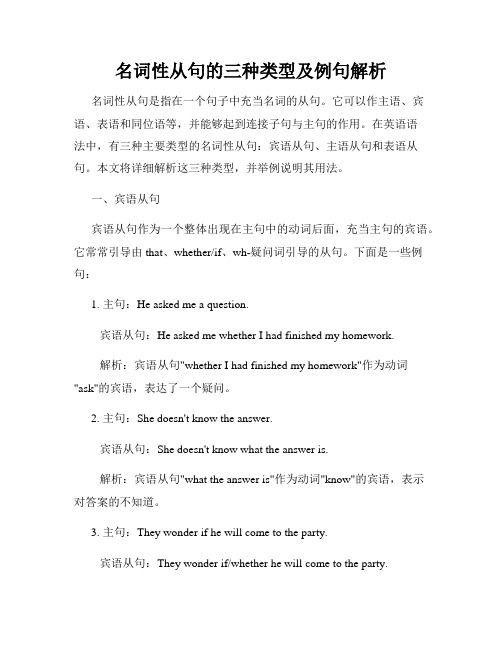
名词性从句的三种类型及例句解析名词性从句是指在一个句子中充当名词的从句。
它可以作主语、宾语、表语和同位语等,并能够起到连接子句与主句的作用。
在英语语法中,有三种主要类型的名词性从句:宾语从句、主语从句和表语从句。
本文将详细解析这三种类型,并举例说明其用法。
一、宾语从句宾语从句作为一个整体出现在主句中的动词后面,充当主句的宾语。
它常常引导由that、whether/if、wh-疑问词引导的从句。
下面是一些例句:1. 主句:He asked me a question.宾语从句:He asked me whether I had finished my homework.解析:宾语从句"whether I had finished my homework"作为动词"ask"的宾语,表达了一个疑问。
2. 主句:She doesn't know the answer.宾语从句:She doesn't know what the answer is.解析:宾语从句"what the answer is"作为动词"know"的宾语,表示对答案的不知道。
3. 主句:They wonder if he will come to the party.宾语从句:They wonder if/whether he will come to the party.解析:宾语从句"if/whether he will come to the party"作为动词"wonder"的宾语,表达了对他是否会来参加派对的疑问。
二、主语从句主语从句作为一个整体出现在句子的最前面,充当主句的主语。
它通常由that引导,也可以由wh-疑问词引导。
以下是一些例句:1. 主句:It is important to learn a foreign language.主语从句:That she is a hardworking student is important.解析:主语从句"That she is a hardworking student"作为句子的主语,强调了她是一个勤奋的学生的重要性。
从句的种类和用法详解

从句的种类和用法详解从句是英语语法中重要的一个部分,由一个主句和一个或多个从句组成。
从句可以增加语言的表达力,使句子更加丰富多样。
本文将详细解释从句的种类和用法,帮助读者更好地理解和运用从句。
一、名词性从句名词性从句在句子中充当名词的功能,可以作主语、宾语、表语或补语。
常见的名词性从句有三种种类:主语从句、宾语从句和表语从句。
1. 主语从句主语从句在句子中充当主语的角色,常以"that"引导。
例如:"That he is late surprises me."(他迟到了让我感到惊讶。
)2. 宾语从句宾语从句在句子中充当动词的宾语,通常由"that"引导,但在口语中可以省略。
例如:"I believe that he will come." (我相信他会来。
)"I know he will come." (我知道他会来。
)3. 表语从句表语从句在句子中充当表语的角色。
例如:"The important thing is that you try your best."(最重要的是你尽力而为。
)二、定语从句定语从句用来修饰名词或代词,常以关系代词或关系副词引导。
定语从句通常紧跟在被修饰的名词或代词之后。
例如:"The man who is speaking is my teacher."(正在说话的那个人是我的老师。
)"The book that I borrowed from the library is interesting."(我从图书馆借的那本书很有趣。
)三、状语从句状语从句用来表达时间、条件、原因、结果、目的、比较等信息,在句子中充当状语的角色。
根据不同的用途,状语从句可以分为六种类型。
1. 时间状语从句时间状语从句用来表示一个动作或事件发生的时间。
- 1、下载文档前请自行甄别文档内容的完整性,平台不提供额外的编辑、内容补充、找答案等附加服务。
- 2、"仅部分预览"的文档,不可在线预览部分如存在完整性等问题,可反馈申请退款(可完整预览的文档不适用该条件!)。
- 3、如文档侵犯您的权益,请联系客服反馈,我们会尽快为您处理(人工客服工作时间:9:00-18:30)。
1.We wonder how we shall do next.
what
பைடு நூலகம்
2.Could you tell me where are they having
a picnic?
they are
3.I am sorry that I don’t know you want to take didn’t
4.形容词短语的宾语
16
3. It作为形式宾语
He has made it clear that he will not give in. See to it that children don’t catch cold. 4.否定的转移 主句的谓语动词为think, consider, suppose, believe, expect, fancy, guess, imagine等, 其后 的宾语从句若含有否定词not, 一般要把否定词not 转移到主句谓语上, 从句谓语用肯定. I don’t think this dress fits you well.____?
part in the competition.
4.Mr. Li seems that he is very expert at repairing at computers. as if
14
无义 1. The mother’s question was that she has no time to look after her daughter.
• They know the teacher is a man . 主语 谓语 宾语从句
▲句子做宾语就是宾语从句。
6
We know (that) Mr. Green teaches English.
宾语从句
1.作宾语的从句 2.在主句谓语动词(及物动词)之后(或介词之后)
7
The reason is that he is a student. 表语从句
10
11
A. 引导宾语从句时可互换. B. 位于介词后要用whether. C. 位于句首时要用whether. D. 引导表语从句, 主语从句, 同位语
从句时, 要用 whether.
12
单项选择
1.I don’t know___C_ we can live on the island without any food.
1.作表语的从句 2.在连系动词之后 3.作用:对主语进行解释说明
8
连接词:that
9
关联词比较
whether / if 1.Please tell me whether / if you will go to
the lecture tomorrow. 2. It all depends on whether the sky will
宾语从句和表语从句
1
一·句子成分
动词作谓语 动词之前作主语 动词之后作宾语 am, is, are 之后做表语 修饰名词作定语
2
区别表语和宾语 •表语也叫补语,是主语补足语,对主语进行 补充说明。表语跟系动词连用,构成系表结构。 •She is a student. • is 是系动词,所以 a student是表语。 •She likes the student. • likes 是实义动词,所以the student 是宾语
clear up. 3. The question iswhetherthe film is well
worth seeing. 4. whether He will be well tomorrow
I am not sure. 5. whether it is true remains a problem.
1.作动词的宾语 动词+间接宾语+宾语从句She told me that she would accept my invitation. 2.作介词的宾语 Our success depends upon how well we can cooperate with one another.
3.非谓语的宾语
4
•She looks nice. •The leaves are turning brown. •He cooks good meals. •It’s getting late. •They owns all the cars.
5
如何区分宾语从句?
• They know the teacher. 主语 谓语 宾语
是否 2.The question is whether that boy will
turn up in time. ….的样子
3. Tom is no longer what he used to be .
…的地方 4.That is where I can’t agree with you.
15
3. The teacher told us that the earth ___B__around the sun.
A moved B moves C move D moving
4.Could you tell me __C______?
A if he would come tomorrow
B will he come tomorrow
3
•常用的连系动词:
•1表示状态存在的词:be, 感官动词(look、smell、sound、feel、taste),seem、 appear等等。 •2、表示状态持续的词:keep、prove、stay、 remain、turn (out)等等。 •3、表示状态转变的词:become,come、fall、get、grow、 make等等。
A.where B what C how D that
2.Could you tell me _________B__________?
A Where is the part ?
B Who’s on duty ?
C Whose book is this ?
D What are they doing ?
C whether he will come tomorrow
D If he comes tomorrow 5.I did n’t know that Mr.
Smith _C_____yet.
• has returned
B has returned
C had returned
D returned
13
